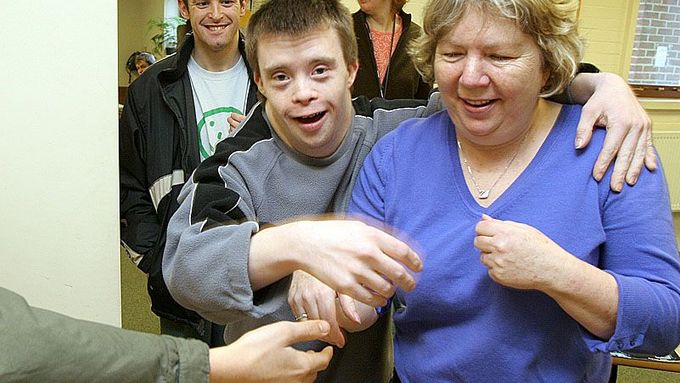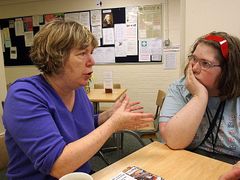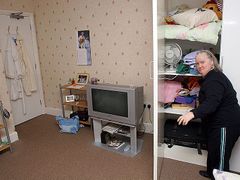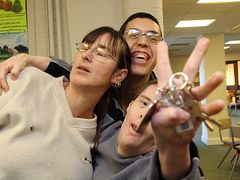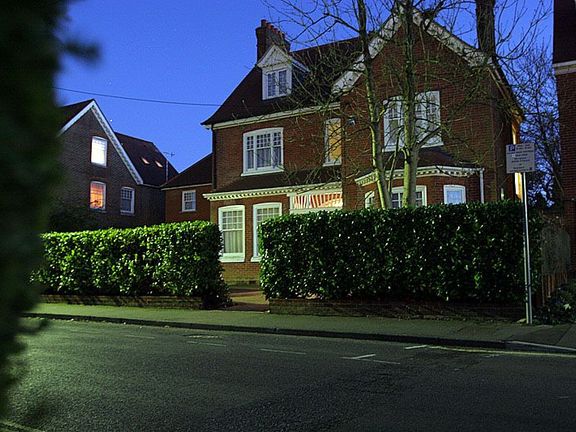
Aktuálně.cz brings you another part in the series of reports about the way the United Kingdom treats its disabled citizens. It was inspired by a recent investigative report of a BBC team, which revealed serious problems in the Czech social care system.
Crawley - It's almost two pm. People are gathering in a church hall not far from the centre of Crawley in West Sussex.
People with disability meet here regularly every Thursday. The Action Group is another organization helping to support them in the UK.
"In the eighties, as soon as they started to live on their own outside social care homes, it was clear they were missing something," the founder of the group, Linda Gray says. "They had nobody to discuss their problems with, nowhere to find confidence. So, ten years ago, I started this group."
Stephan, Scharlotte and Andrew come into the common room. Similar to other group members, they suffer from different forms of mental or physical handicap.
Yet each of them lives in an environment of their choice. Some of them are living at home with their parents, others in flats in the city centre, or sharing accommodation with other people.
At the Action Group meetings, they discuss their problems looking for solutions. It's not important whether they are able to express them in words, everybody is given a platform.
"Before, all these people would have been institutionalized," Linda from Outreach 3 Way says. "They would have no independence, would just be surviving."
Different brain
Fifteen people take seats on the chairs set in a circle. The Group founder Linda is still leading the sessions nowadays.
"Is anybody afraid of anything, anybody has a problem?" she asks to begin the session. "No, everything is fine," the group members answer. "Any news?" Linda continues.
Stephan is boasting: he is going to Paris for holidays. "I will see mom this weekend," Garry says. "And we'll be going to Spain in May."
Some of those present have difficulties making understand themselves. Nevertheless, Linda is patiently listening to everybody until she gets their meaning right. Some of them use a tablet with drawings to communicate.
"Did you hear the story on the news about a disabled person who was attacked and died as a consequence?" Linda starts a new theme. "Shall we discuss that?" Majority agree. "It was frightening, shocking..."
The theme is set today, they will discuss bullying of disabled people. Each participant has personal experience with the problem. One after another, they all speak of their ordeal.
"I showed my disabled person pass on the bus, and the lads sitting behind me started to pull my hair and laugh at me," Emma (35) tells her story. "I told them to leave me alone. The fact my brain is different from yours doesn't mean I am unable to do what others do. You are the ones with an attitude problem."
The group applauds loudly and laughs. There is a short break, everybody has cash, and they are buying coffee or tea. They have time to think about how to react to bullying.
"More and more disabled people are being attacked or bullied," Linda explains during the break why she pointed the group specifically to this topic. "To survive they need to be assertive and learn how to stand up to the challenge."
It's enough to listen
A couple of years ago, some of the group members were still unable to communicate with their environment. "I had absolutely no self-confidence," Scharlotte (25) recalls. "I was just staring into the ground, not even saying hello to anybody."
Scharlotte is afflicted by both physical and mental disability. She underwent over twenty operations, not long ago she was still living with her mother.
"She was doing everything for me, cooking, cleaning, paying the bills," the girl wearing glasses says. "Then I told myself, enough is enough, I want to learn these things myself."
At first, she was visiting the day centre of the non-profit organisation Outreach 3 Way. She was learning to paint. "I suggested she should be coming to our group," Linda explains. "At the beginning she did not want to, but then she came in. She needed plenty of support to be able to explain to her mother she'd leave and live on her own.
In the end, Scharlotte made it. Nowadays she's sharing a house with five other people and has a room of her own. She goes to visit her mother.
"I learned many things, I am more confident, I don't need as much care as I did before," she says. "The only thing I need help with now is cleaning and dealing with official letters."
Linda says Scharlotte is a good example of giving disabled people both strength and confidence to deal with everyday problems.
"It's enough to listen to what they need and to support them," she says. "Then they are able to live an independent life."
A letter against bullying
Both Linda and Scharlotte return from the break to the common room and the group meeting continues. Stephan (25) suggests solving the problem of bullying by either running away or defending himself. The group is dissuading him from fighting. "What if the other one is stronger," somebody says. "I'd prefer to leave, should somebody be bullying."
At the end of session, it's Garry's turn to speak. It's quite difficult to understand what he says, but Linda gets his meaning after a moment.
Garry is describing with hand gestures and moving his body bullying at his school. He's upset; Linda is looking for the ways to help and support him.
Gradually, Garry calms down. Linda suggests she would help him write a letter to the school principals asking them to solve the problem. Garry agrees.
At the end, the group sums up all the conclusions of the day's debate about how to defeat bullying. They all leave then to go home: some of them are picked up by their parents; some are driven by a social worker to their shared accommodation.
To live with Kevin
Janette walks on her own to a house not far from the city centre. She's living there together with six other people. But it is not a typical institution.
Everybody has a room of his or her own, with only a client (called tenants here) having a key.
They can go on their own into town, to shop or to a pub. Janette goes twice a week to work for a local charity shop. She's using money, shops, and cooks with help from others.
She only requires support from the employees an hour a day they help her with budgeting and checking that the bills are paid. The rent is paid by the government through allowances for each client.
Only one employee is on duty at Windsor House during the day. At night, there is nobody. In emergency, tenants can summon help through a specially adapted phone by pressing a single key.
Every six months a social worker, Janette's relatives, Janette and an employee from the organization supporting her meet to discuss what help and what support Janette needs for the next period.
"I like it here," Janette says (she has problems speaking). "It's fantastic. That's a gift I've got from Kevin," she shows her ring. She sees her boyfriend every Monday. "I would like to share a bed with him and to be with him all the time."
That's a new piece of information for the carer. "Not so long ago, you didn't want anything of the sort. We'd have to consult Kevin first and ask him whether he would like that too," she says. "Of course, if you want it, we will support you."

